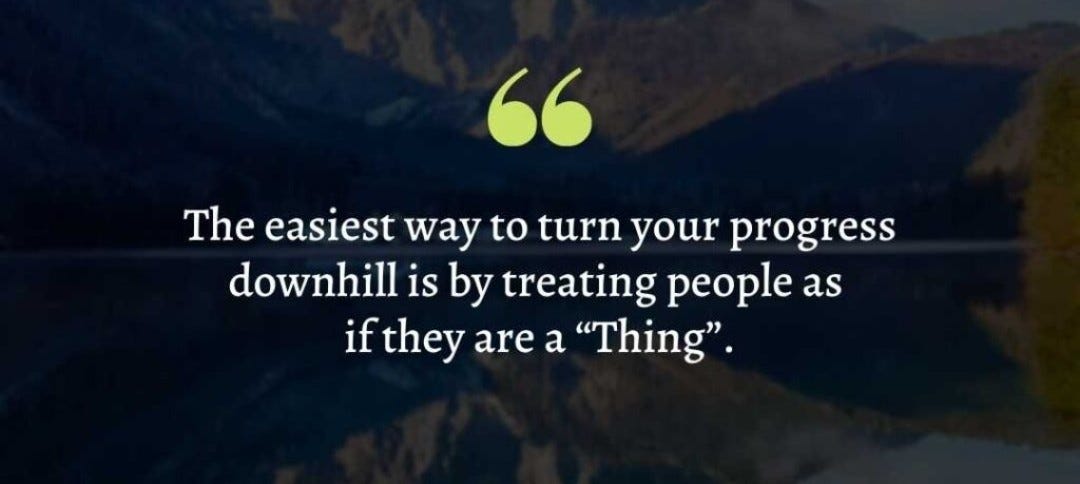The Notion of Human Dignity and Top Down Leadership
Culture plays a pivotal role in any company's success. I'm not recognized as a widely spiritual being but in John 13 Yeshua exercised humility by washing the feet of those beneath him. At the same time, Mike Tyson said, "If you're not humble in this world, then the world will throw humbleness upon you."
One fundamental portion of solid culture that is often overlooked, is the behavior of executives. The way top-level executives treat low-level employees can either foster a thriving, positive culture or create an environment rife with dysfunction and toxicity.
I get calls all the time about how poorly trash executives treat those who seem lower than them. I've seen it. I've fought against it. I've watched executives portray exceptional, hard-working, high-performing employees as trash or as less than simply because they feel they can. I've seen them extort demonize and even frame excellent employees to make those good employees look bad while promoting those who will tolerate, or even aid in those activities or insulate that kind of behavior.
I've watched PE Boards run excellent companies with great cultures through solid leadership that excelled leading to early, highly profitable exits, while at the same time buying, running, and tolerating total dumpster fires due to bad leadership that failed to grow, produce, or ever turn a profit. Having to continually push out exits to try and save face rather than just dump the trash leadership and build a solid company.
When executives treat employees poorly, it sends a clear message that respect and dignity are not values prioritized within the organization. Such behavior not only corrodes the morale of employees but also undermines trust in leadership.
Key aspects of executive behavior that contribute to workplace dysfunction and bad culture:
👉 You're unfamiliar and disconnected. One major issue is a deficiency in empathy. Executives who are disconnected from the realities faced by everyday people and employees often make decisions that are detrimental to them.
👉 You dismiss the ideas and concerns of lower-level employees and stifle creativity and innovation. This attitude sends a message that only a select few have valuable insights, discouraging collaboration and causing resentment.
👉 Micro-Managing: This behavior not only erodes trust but also inhibits autonomy and growth, ultimately hampering the organization's potential.
👉 Inconsistencies between words and deeds erode trust and contribute to a toxic culture.
💥🔥The Ripple Effect:
The negative impact of executive behavior does not remain confined to the top of an organization. It has a ripple effect that permeates throughout the entire workforce. Dysfunctional cultures can result in increased turnover, decreased productivity, and tarnished reputation, all of which can significantly harm your bottom line.
💡The fix
✔️Executives should reflect on their behavior and consider how it impacts their employees and ultimately their organization.
✔️Building empathy by listening to employees and valuing their perspectives can help bridge gaps.
✔️Executives should model the values and behaviors they expect from the rest of the organization, ensuring words and actions align.
✔️At the end of the day, just be a good person. Treat people the way you want to be treated but most of all, don't think too highly of yourself, especially if it's at the expense of others.
✔️Dignity and respect for everyone goes a long way. How you treat the lowest person says everything about you.
✔️Lastly, humanity dictates that evil hearts and minds prevail when good people see it happening and do nothing. Corporate Boards, Human Resources Leadership, Real Leaders, and even everyday employees should be standing up to trash leadership that degrades and undervalues and person or employee through a lack of respect and dignity.
Recognizing trash leadership and addressing it is crucial for the long-term success and sustainability of any organization, and it begins with the actions of those at the top. Real leadership starts with good corporate governance and understanding No-one is more worthy or deserving of respect than anyone else. Being a humble servant leader enables us to recognize within each other the shared humanity that enables us to act towards each other with respect regardless of position, title, or status.


